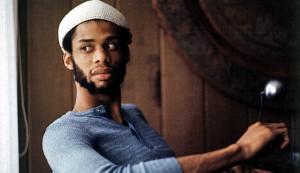As we approach the April finale of March Madness, we should pause to consider one of the all-time greats, Lew Alcindor, who won three consecutive national championships (1967-1969) with UCLA and was three-time MVP of the NCAA tournament. Over at Aljazeera, he explains why he converted from Christianity to Islam and changed his name to Kareem Abdul-Jabbar. It’s a powerful essay that touches on issues of race, identity, and politics. His conversion was in part a protest against the majority religion which he saw as a culprit:
Much of my early awakening came from reading The Autobiography of Malcolm X as a freshman. I was riveted by Malcolm’s story of how he came to realize that he was the victim of institutional racism that had imprisoned him long before he landed in an actual prison. That’s exactly how I felt: imprisoned by an image of who I was supposed to be. The first thing Malcolm did was push aside the Baptist religion that his parents had brought him up in and study Islam. To him, Christianity was a foundation of the white culture responsible for enslaving blacks and supporting the racism that permeated society. His family was attacked by the Christianity-spouting Ku Klux Klan, and his home was burned by the KKK splinter group the Black Legion.
Inspired by Malcom, Abdul-Jabbar began studying the Koran and eventually converted to Islam. Contrary to popular belief then and now, Abdul-Jabbar did not join the inaptly named “Nation of Islam.” Regardless, his decision vexed both his parents and white America:
The question I’m often asked is why I had to pick a religion so foreign to American culture and a name that was hard for people to pronounce. Some fans took it very personally, as if I had firebombed their church while tearing up an American flag…My parents were not pleased by my conversion. Though they weren’t strict Catholics, they had raised me to believe in Christianity as the gospel. But the more I studied history, the more disillusioned I became with the role of Christianity in subjugating my people. I knew, of course, that the Second Vatican Council in 1965 declared slavery an “infamy” that dishonored God and was a poison to society. But for me, it was too little, too late. The failure of the church to use its might and influence to stop slavery and instead to justify it as somehow connected to original sin made me angry. Papal bulls (e.g., “Dum Diversas” and “Romanus Pontifex”) condoned enslaving native people and stealing their lands.
And while I realize that many Christians risked their lives and families to fight slavery [bless John Brown’s soul] and that it would not have been ended without them, I found it hard to align myself with the cultural institutions that had turned a blind eye to such outrageous behavior in direct violation of their most sacred beliefs.
From that year to this, I have never wavered or regretted my decision to convert to Islam. When I look back, I wish I could have done it in a more private way, without all the publicity and fuss that followed. But at the time I was adding my voice to the civil rights movement by denouncing the legacy of slavery and the religious institutions that had supported it. That made it more political than I had intended and distracted from what was, for me, a much more personal journey.
The irony in all this is that Abdul-Jabbar chose a religion which would which in some ways supplant race as the next great bogeyman for large segments of white-Christian America. So having jumped out of the racial frying pan, Abdul-Jabbar now finds himself in the religious fire:
Kermit the Frog famously complained, “It’s not easy being green.” Try being Muslim in America. According to a Pew Research Center poll on attitudes about major religious groups, the U.S. public has the least regard for Muslims — slightly less than it has for atheists — even though Islam is the third-largest faith in America. The acts of aggression, terrorism and inhumanity committed by those claiming to be Muslims have made the rest of the world afraid of us. Without really knowing the peaceful practices of most of the world’s 1.6 billion Muslims, they see only the worst examples. Part of my conversion to Islam is accepting the responsibility to teach others about my religion, not to convert them but to co-exist with them through mutual respect, support and peace. One world does not have to mean one religion, just one belief in living in peace.
While there is a hint of naivete in this conclusion, I’m not going to complain or critique. More power to Abdul-Jabbar and I hope he keeps writing.


